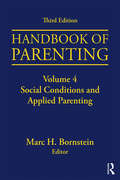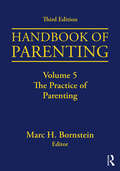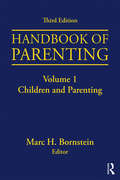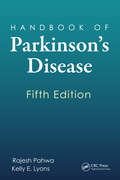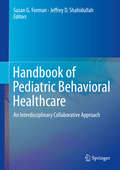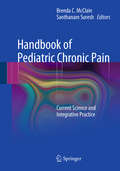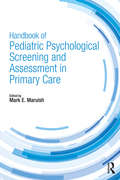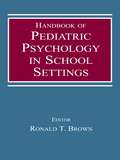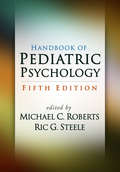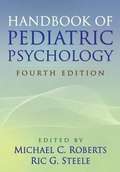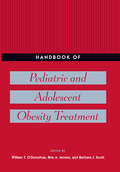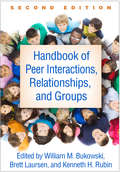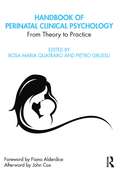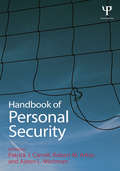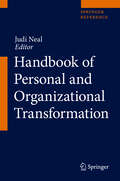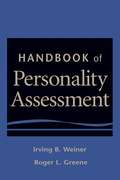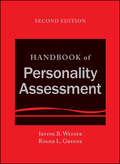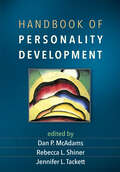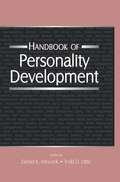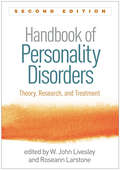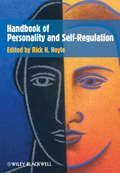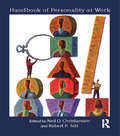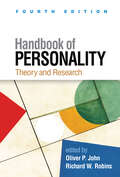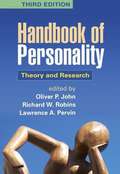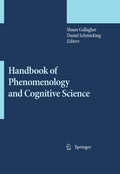- Table View
- List View
Handbook of Parenting: Volume 4: Social Conditions and Applied Parenting, Third Edition
by Marc H. BornsteinThis highly anticipated third edition of the Handbook of Parenting brings together an array of field-leading experts who have worked in different ways toward understanding the many diverse aspects of parenting. Contributors to the Handbook look to the most recent research and thinking to shed light on topics every parent, professional, and policymaker wonders about. Parenting is a perennially "hot" topic. After all, everyone who has ever lived has been parented, and the vast majority of people become parents themselves. No wonder bookstores house shelves of "how-to" parenting books, and magazine racks in pharmacies and airports overflow with periodicals that feature parenting advice. However, almost none of these is evidence-based. The Handbook of Parenting is. Period. Each chapter has been written to be read and absorbed in a single sitting, and includes historical considerations of the topic, a discussion of central issues and theory, a review of classical and modern research, and forecasts of future directions of theory and research. Together, the five volumes in the Handbook cover Children and Parenting, the Biology and Ecology of Parenting, Being and Becoming a Parent, Social Conditions and Applied Parenting, and the Practice of Parenting. Volume 4, Social Conditions and Applied Parenting, describes socially defined groups of parents and social conditions that promote variation in parenting. The chapters in Part I, on Social and Cultural Conditions of Parenting, start with a relational developmental systems perspective on parenting and move to considerations of ethnic and minority parenting among Latino and Latin Americans, African Americans, Asians and Asian Americans, Indigenous parents, and immigrant parents. The section concludes with considerations of disabilities, employment, and poverty on parenting. Parents are ordinarily the most consistent and caring people in children’s lives. However, parenting does not always go right or well. Information, education, and support programs can remedy potential ills. The chapters in Part II, on Applied Issues in Parenting, begin with how parenting is measured and follow with examinations of maternal deprivation, attachment, and acceptance/rejection in parenting. Serious challenges to parenting—some common, such as stress and depression, and some less common, such as substance abuse, psychopathology, maltreatment, and incarceration—are addressed as are parenting interventions intended to redress these trials.
Handbook of Parenting: Volume 5: The Practice of Parenting, Third Edition
by Marc H. BornsteinThis highly anticipated third edition of the Handbook of Parenting brings together an array of field-leading experts who have worked in different ways toward understanding the many diverse aspects of parenting. Contributors to the Handbook look to the most recent research and thinking to shed light on topics every parent, professional, and policy maker wonders about. Parenting is a perennially "hot" topic. After all, everyone who has ever lived has been parented, and the vast majority of people become parents themselves. No wonder bookstores house shelves of "how-to" parenting books and magazine racks in pharmacies and airports overflow with periodicals that feature parenting advice. However, almost none of these is evidence-based. The Handbook of Parenting is. Period. Each chapter has been written to be read and absorbed in a single sitting, and includes historical considerations of the topic, a discussion of central issues and theory, a review of classical and modern research, and forecasts of future directions of theory and research. Together, the five volumes in the Handbook cover Children and Parenting, the Biology and Ecology of Parenting, Being and Becoming a Parent, Social Conditions and Applied Parenting, and the Practice of Parenting. Volume 5, The Practice of Parenting, describes the nuts-and-bolts of parenting as well as the promotion of positive parenting practices. Parents meet the biological, physical, and health requirements of children. Parents interact with children socially. Parents stimulate children to engage and understand the environment and to enter the world of learning. Parents provision, organize, and arrange their children’s home and local environments and the media to which children are exposed. Parents also manage child development vis-à-vis childcare, school, the circles of medicine and law, as well as other social institutions through their active citizenship. The chapters in Part I, on Practical Parenting, review the ethics of parenting, parenting and the development of children's self-regulation, discipline, prosocial and moral development, and resilience as well as children’s language, play, cognitive, and academic achievement and children’s peer relationships. The chapters in Part II, on Parents and Social Institutions, explore parents and their children’s childcare, activities, media, schools, and healthcare and examine relations between parenthood and the law, public policy, and religion and spirituality.
Handbook of Parenting: Volume I: Children and Parenting, Third Edition
by Marc H. BornsteinThis highly anticipated third edition of the Handbook of Parenting brings together an array of field-leading experts who have worked in different ways toward understanding the many diverse aspects of parenting. Contributors to the Handbook look to the most recent research and thinking to shed light on topics every parent, professional, and policymaker wonders about. Parenting is a perennially "hot" topic. After all, everyone who has ever lived has been parented, and the vast majority of people become parents themselves. No wonder bookstores house shelves of "how-to" parenting books and magazine racks in pharmacies and airports overflow with periodicals that feature parenting advice. However, almost none of these is evidence-based. The Handbook of Parenting is. Period. Each chapter has been written to be read and absorbed in a single sitting, and includes historical considerations of the topic, a discussion of central issues and theory, a review of classical and modern research, and forecasts of future directions of theory and research. Together, the five volumes in the Handbook cover Children and Parenting, the Biology and Ecology of Parenting, Being and Becoming a Parent, Social Conditions and Applied Parenting, and the Practice of Parenting. Volume 1, Children and Parenting, considers parenthood as a functional status in the life cycle: Parents protect, nurture, and teach their progeny, even if human development is more dynamic than can be determined by parental caregiving alone. Volume 1 of the Handbook of Parenting begins with chapters concerned with how children influence parenting. Notable are their more obvious characteristics, like child age or developmental stage; but subtler ones, like child gender, physical state, temperament, mental ability, and other individual-differences factors, are also instrumental. The chapters in Part I, on Parenting across the Lifespan, discuss the unique rewards and special demands of parenting children of different ages and stages – infants, toddlers, youngsters in middle childhood, and adolescents—as well as the modern notion of parent-child relationships in emerging adulthood, adulthood, and old age. The chapters in Part II, on Parenting Children of Varying Status, discuss common issues associated with parenting children of different genders and temperaments as well as unique situations of parenting adopted and foster children and children with a variety of special needs, such as those with extreme talent, born preterm, who are socially withdrawn or aggressive, or who fall on the autistic spectrum, manifest intellectual disabilities, or suffer a chronic health condition.
Handbook of Parkinson's Disease (Neurological Disease and Therapy)
by Rajesh Pahwa Kelly E. LyonsHighly Commended, BMA Medical Book Awards 2014This volume has long prevailed as one of the leading resources on Parkinson's disease (PD). Fully updated with practical and engaging chapters on pathology, neurochemistry, etiology, and breakthrough research, this source spans every essential topic related to the identification, assessment, and treatme
Handbook of Pediatric Behavioral Healthcare: An Interdisciplinary Collaborative Approach
by Jeffrey D. Shahidullah Susan G. FormanThis handbook addresses the delivery of high quality pediatric behavioral healthcare services that are multitiered, evidence-based, and integrated, involving interprofessional collaboration across child serving systems, such as pediatrician offices and schools. The book sets forth a contemporary, leading edge approach that reflects the relationship between biological and psychosocial development and the influence of multiple systems, including the family, community, school, and the healthcare system on child development and functioning. It assists child-focused providers in developing knowledge about the relationship between biological and psychosocial development and between pediatric physical health and behavioral health problems. Chapters cover common chronic illnesses and behavioral conditions and include guidelines for screening, assessment, diagnosis, prevention, and coordinated intervention. Chapters also include representative case studies that help illustrate efficacious, effective service-delivery approaches. The handbook concludes with recommendations for future research and directions for integrated pediatric behavioral healthcare.Topics featured in the Handbook include:Behavioral health aspects of chronic physical health conditions, including asthma, diabetes, chronic pain, traumatic brain injury, and cancer.Physical health implications of behavioral health and educational problems, including ADHD, learning disabilities, substance abuse, and ASD.Coping with chronic illness and medical stress.Patient adherence to medical recommendations and treatments.School reintegration after illness.The Handbook of Pediatric Behavioral Healthcare is a must-have resource for researchers, professors, and graduate students as well as clinicians, therapists, and other practitioners in clinical child and school psychology, primary care medicine, social work, child and adolescent psychiatry, public health, health psychology, pediatric medicine, nursing, behavioral therapy, rehabilitation, and counseling.
Handbook of Pediatric Chronic Pain
by Santhanam Suresh Brenda C. McclainThe purpose of this text is to provide not only the science and current knowledge of pediatric pain management but a rationale for intervention. The book is ground-breaking in that it provides pearls for the recognition and management of multiple childhood chronic pain syndromes. Also, uncommon yet confounding issues such as pain management for epidermolysis bullosa are adequately addressed. Concerns unique to pediatric patients are reviewed. While there are no firm standards in pediatric chronic pain, a care plan is offered to help guide practitioners when possible. The book will consist of 24 chapters, many co-written by a physician and a psychologist. Chapter 1 covers the history of pediatric chronic pain, the advancement pediatric pain as a clinical subspecialty, development of pediatric pain clinics, and characterization of the common pain syndromes. Chapters 2-4 cover, respectively, the research on early pain exposure and neuroplasticity, theories on the common adolescent pain syndromes, and the demographics of chronic pain in children. Chapters 5-16 discuss approaches to assessment and intervention for specific pediatric and adolescent pain syndromes. Chapters 17-23 address interventional techniques such as therapeutic blocks, neurablation, implantable systems, physical therapy, complementary therapy, and pharmacology including opioid tolerance. The final chapter discusses the role of the nurse practitioner in pediatric chronic pain.
Handbook of Pediatric Psychological Screening and Assessment in Primary Care
by Mark E. MaruishHandbook of Pediatric Psychological Screening and Assessment in Primary Care provides an overview of the principles of screening, monitoring, and measuring of the treatment outcomes of behavioral health disorders in pediatric primary care. The Handbook serves as a guide to the selection of psychometric measures that can be used to screen for and/or assess behavioral health problems of children and adolescents. The Handbook is an invaluable reference to behavioral health clinicans in maximizing potential benefits in efficient assessment and effective treatment of children and adolescents in pediatric primary care settings as well as other health care settings.
Handbook of Pediatric Psychology in School Settings
by Ronald T. BrownIn recent years the escalating costs of health care have caused managed care programs to shift the delivery of pediatric psychological services away from specialized medical centers and into primary care and school settings. One result has been a radical expansion of school psychology into issues of clinical intervention, health promotion, and the assessment of psychotropic medications. School psychologists are now expected to either deliver or (more likely) to provide consultation regarding a wide variety of pediatric psychological services. Because this is a recent phenomenon, very few school-based psychologists or allied health practitioners (school counselors and social workers) have received training in pediatric psychology. The mission of this book is to provide them with a comprehensive and authoritative guide to their newly acquired responsibilities in such areas as psychotherapy, psychopharmacology, health promotion, and prevention of disease. This book is appropriate for anyone concerned with issues of pediatric psychology in school settings: school psychologists, pediatric psychologists, clinical child psychologists, as well as pediatricians and child psychiatrists.
Handbook of Pediatric Psychology, Fifth Edition
by Michael C. Roberts Ric G. SteeleThousands of practitioners and students have relied on this handbook, now thoroughly revised, for authoritative information on the links between psychological and medical issues from infancy through adolescence. Sponsored by the Society of Pediatric Psychology, the volume explores psychosocial aspects of specific medical problems, as well as issues in managing developmental and behavioral concerns that are frequently seen in pediatric settings. The book describes best practices in training and service delivery and presents evidence-based approaches to intervention with children and families. All chapters have been rigorously peer reviewed by experts in the field. New to This Edition: *Chapters on rural health, the transition to adult medical care, prevention, and disorders of sex development. *Expanded coverage of epigenetics, eHealth applications, cultural and ethnic diversity, spina bifida, and epilepsy. *Many new authors; extensively revised with the latest with the latest information on clinical populations, research methods, and interventions. *Chapters on training and professional competencies, quality improvement and cost-effectiveness, and international collaborations. See also Clinical Practice of Pediatric Psychology, edited by Michael C. Roberts, Brandon S. Aylward, and Yelena P. Wu, which uses rich case material to illustrate intervention techniques.
Handbook of Pediatric Psychology, Fourth Edition
by Michael Roberts Ric SteeleSponsored by the Society of Pediatric Psychology, this handbook is recognized as the definitive reference in the field. In concise, peer-reviewed chapters, leading authorities comprehensively examine links between psychological and medical issues from infancy through adolescence. Psychosocial aspects of specific medical problems and developmental, emotional, and behavioral disorders are reviewed. The volume showcases evidence-based approaches to intervention and prevention. It describes innovative ways that professionals can promote positive health behaviors; help children and families cope with medical conditions and their treatment; and collaborate across disciplines to deliver effective clinical services in primary care, mental health, and school settings.
Handbook of Pediatric and Adolescent Obesity Treatment
by William T. O'Donohue Barbara J. Scott Brie A. MooreThis volume brings together behavioral, medical, and public health approaches and provides the knowledge necessary for a wide range of practitioners to effectively address the current obesity epidemic among children and adolescents. The book addresses several themes in pediatric and adolescent obesity. Experts in the field discuss the prevalence, etiology, and sequelae of pediatric and adolescent obesity, as well as the medical and behavioral assessment of the overweight child, adolescent, and family. The book offers a comprehensive understanding of the wide range of approaches to pediatric and adolescent obesity treatment, in order to promote an individualized approach that will best fit the patient and family.
Handbook of Peer Interactions, Relationships, and Groups, Second Edition
by William M. Bukowski Brett Laursen Kenneth H. RubinThe definitive handbook on peer relations has now been significantly revised with 55% new material. Bringing together leading authorities, this volume presents cutting-edge research on the dynamics of peer interactions, their impact on multiple aspects of social development, and the causes and consequences of peer difficulties. From friendships and romance to social withdrawal, aggression, and victimization, all aspects of children's and adolescents' relationships are explored. The book examines how individual characteristics interact with family, group, and contextual factors across development to shape social behavior. The importance of peer relationships to emotional competence, psychological well-being, and achievement is analyzed, and peer-based interventions for those who are struggling are reviewed. Each chapter includes an introductory overview and addresses theoretical considerations, measures and methods, research findings and their implications, and future directions. New to This Edition *Chapters on topics largely new to the field: neuroscience, social media, social inequality, prosocial behavior with peers, and sociological approaches. *Expanded coverage of applied issues: chapters on interventions for socially withdrawn children, activity programs that promote positive youth development, and policy initiatives. *Chapters on same- and other-sex peer relationships, peer influence, educational environments, evolutionary models, the self-concept, personality, and animal studies. *Increased attention to variations in peer relations due to culture, gender, and race. *Many new authors and topics reflect a decade's worth of theoretical and methodological advances, including the growing use of complex longitudinal methods.
Handbook of Perinatal Clinical Psychology: From Theory to Practice
by Rosa Maria Quatraro Pietro GrussuThe book examines the major issues in perinatal clinical psychology with the presence of theoretical information and operational indications, through a biopsychosocial approach. The multiplicity of scientific information reported makes this book both a comprehensive overview on the major perinatal mental health disorders and illnesses, and a clinical guide. It covers perinatal clinical psychology through a journey of 15 chapters, putting the arguments on a solid theoretical basis and reporting multiple operational indications of great utility for daily clinical practice. It has well documented new evidence bases in the field of clinical psychology that have underpinned the conspicuous current global and national developments in perinatal mental health. As such, it is an excellent resource for researchers, policy makers, and practitioners – in fact, anyone and everyone who wishes to understand and rediscover, in a single opera, the current scientific and application scenario related to psychological health during pregnancy and after childbirth.
Handbook of Personal Security
by Patrick J. Carroll Robert M. Arkin Aaron L. WichmanThe issue of psychological security within an increasingly unstable, interconnected world has become a defining challenge of modern individual and cultural life. The terror attacks of September 11, 2001 and the global financial crisis that unfolded in 2008 have intensified a sense of global and personal insecurity. This concern with psychological insecurity is reflected in contemporary culture, politics, the business world, consumer behavior, the arts, and other areas. Within this context, the psychological sciences have kept pace, vigorously investigating these issues. This handbook features the latest theory and research examining cognitive, emotional, and behavioral responses to security threats. It expands the conceptual focus from specific security threats to the broader range of antecedents, processes, and consequences of psychological security/insecurity. The chapters are organized into four content areas: personal security in individual contexts, personal security in interpersonal contexts, personal security with cultural and health contexts, and interdisciplinary analyses of personal security. They represent a new and vibrant area of research unified by the common goal of understanding the factors that shape a sense of personal security. Together, these provocative chapters provide specific starting points that will shape future theory, policy, and practice on this dominant social issue of the 21st Century and, more importantly, offer opportunities to connect social and personality psychology to its scientific kin.
Handbook of Personal and Organizational Transformation
by Judi NealThis handbook is based on the premise that there can be no organizational transformation without personal transformation. Anything else is just moving the chairs around on the deck of the Titanic, and we see that all too often in organizations today. Einstein said that we cannot solve problems from the same mindset that created the problems. In order to see positive change occur in the world, we must shift our consciousness to a high level of thinking and being, but we must also have systems or approaches that scale up, so that there is a collective shift in consciousness in groups, work teams, villages, governments, and corporations. This handbook aims to draw the best and most creative thinking about the field of transformation in one place, to present a comprehensive overview of leading edge transformation theories and approaches for both the academic and the practitioner. In fact, the lines between academic and practitioner are becoming more and more blurred these days. Many management faculty also consult to organizations, a practice that deeply enriches their teaching and research. And many successful full-time consultants conduct high quality research to support their approaches and change initiatives. This Handbook aims to be a creative dialogue in this space that integrates transformation theory and practice. The Handbook of Personal and Organizational Transformation acknowledges the classic literature and principles that have informed the field to date, but primarily showcases authors who are on the cutting edge of new theories and new approaches to give us their latest thinking. Some of these ideas are conjecture about what is possible in human and organizational development. Some of these approaches are currently being tested in the field and may not yet have scientific results. And some of these theories and models have stunning results, but may not have been published in academic journals because the author is a practitioner instead of an academic, or because the concepts are a little too far out of the mainstream. The aim of this book is to expand the reader’s thinking and to encourage readers to be courageous about their involvement in creating transformation, at whatever level they feel called to do so. It will serve as an essential resource for researchers and students of organizational culture, leadership, and change management, as well as consultants, business and team leaders, and anyone interested in global trends and their impact on corporate culture.
Handbook of Personality Assessment
by Greene Weiner Irving B. Roger L.This comprehensive, balanced guide to personality assessment, written by two of the foremost experts in the field, is sure to become the gold standard of texts on this topic. The Handbook of Personality Assessment covers everything from the basics, including a historic overview and detailed discussion of the assessment process and its psychometric foundations, to valuable sections on conducting the assessment interview and the nature, interpretation, and applications of the most popular self-report (objective) and performance-based (projective) measures. A concluding section of special topics such as computerized assessment, ethical and legal issues, and report writing are unique to this text.
Handbook of Personality Assessment
by Irving B. Weiner Roger L. GreeneThe Handbook of Personality Assessment provides comprehensive guidance on the administration, scoring, and interpretation of the most widely-used instruments. Written by two of the field's foremost authorities, this well-balanced guide blends theory and application to provide a foundational reference for both graduate students and professionals. Updated to reflect the most current advances, this second edition includes new chapters on the Minnesota Personality Inventory-Restructured Form and the Rorschach Performance Assessment System, along with in-depth coverage of the MMPI-2, MMPI-2-A, MCMI-IV, PAI, NEO-PI-R, Rorschach Comprehensive System, TAT, and Figure Drawing and Sentence Completion Methods. Each instrument is discussed in terms of its history, administration, scoring, validity, assessment, interpretation, applications, and psychometric foundations, and other chapters address ethical considerations and provide general guidelines in the assessment process. Personality assessments guide recommendations in a broad range of clinical, health care, forensic, educational, and organizational settings. This book delves deeply into the nature and appropriate use of the major assessment instruments, with authoritative insight and practical guidance. Review the latest concepts, research, and practices Administer, score, and interpret the most widely-used instruments Understand the psychometric foundations of personality assessment Access downloadable sample reports that illustrate software interpretation An individual's nature and disposition can be assessed in several ways. This book focuses on standardized psychological tests that assess personality characteristics and indicate how a person is likely to think, feel, and act. The results can only be as accurate as the process, from assessment selection and administration, to scoring, interpretation, and beyond. The Handbook of Personality Assessment is an invaluable resource for every stage of the process, with a practical focus and advice from two leading experts.
Handbook of Personality Development
by Rebecca L. Shiner Jennifer L. Tackett Dan P. McAdamsBringing together prominent scholars, this authoritative volume considers the development of personality at multiple levels--from the neuroscience of dispositional traits to the cultural shaping of life stories. Illustrated with case studies and concrete examples, the Handbook integrates areas of research that have often remained disparate. It offers a lifespan perspective on the many factors that influence each individual's psychological makeup and examines the interface of personality development with health, psychopathology, relationships, and the family. Contributors provide broad-based, up-to-date reviews of theories, empirical findings, methodological innovations, and emerging trends. See also the authored volume The Art and Science of Personality Development, by Dan P. McAdams.
Handbook of Personality Development
by Todd D. Little Daniel K. MroczekThis handbook is the first volume to provide a comprehensive look at personality development. It features a state-of-the-art examination of the field, an area that is enjoying a resurgence in popularity. Five major types of advances, all of which are represented in this volume, are the result of the recent burst in research activity in this area: 1) new theoretical perspectives, 2) higher-quality empirical studies, 3) more sophisticated research designs and analyses, 4) attention to development across the lifespan, and 5) the growing prominence of interdisciplinary approaches to personality development. The Handbook of Personality Development is comprehensive across the lifespan, in its range of personality constructs, and in its coverage of theoretical and methodological frameworks. It is the first volume to address the most important personality development theoretical frameworks in one location--the evolutionary, physiological, behavioral genetic, and socio-cultural perspectives. The book also reviews new statistical techniques that allow for the estimation of individual differences in stability and the analysis of change. The latter part of the book focuses on personality development over the lifespan, from infancy to older adulthood. The authors address personality variables such as emotion regulation, temperament, and self-concept across the lifespan. The book concludes with a compelling capstone chapter by Dan McAdams on how personality develops. The Handbook of Personality Development provides an historical account of, and summary of, the most significant and important findings in the area, along with suggestions for future research.Intended for researchers and advanced students in personality, developmental, social, clinical, and educational psychology, as well as related fields such as family studies, sociology, education, nursing, behavioral genetics, neuropsychology, and psychophysiology, the handbook also serves as a valuable resource in advanced courses that address personality development.
Handbook of Personality Disorders, Second Edition: Theory, Research, and Treatment
by W. John Livesley Roseann LarstoneThe leading reference on personality disorders and their treatment, this authoritative work is now significantly revised with 80% new content reflecting important advances in the field. Preeminent experts provide in-depth coverage of conceptual and taxonomic issues, psychopathology, epidemiology and longitudinal course, etiology and development, and specific diagnoses. Diagnostic issues are explored and available assessment instruments discussed. All available evidence-based treatments are reviewed in consistently organized chapters that cover theoretical and empirical foundations as well as clinical strategies, facilitating comparison of the various approaches. New to This Edition *Incorporates more than 15 years of major research advances; includes 21 chapters on new topics. *Critically examines DSM-5 diagnostic criteria. *Chapters on additional treatments--mentalization-based treatment, schema-focused therapy, transference-based psychotherapy, and systems training for emotional predictability and problem solving. *Chapters on cutting-edge topics such as dimensional models, longitudinal studies, and personality pathology in children and adolescents. *Chapters on specific diagnoses: antisocial/psychopathic, borderline, and obsessive–compulsive personality disorder. *Integrative section introductions by the editors. See also Integrated Treatment for Personality Disorder, edited by W. John Livesley, Giancarlo Dimaggio, and John F. Clarkin, which weaves multiple well-established intervention strategies into a systematic modular approach.
Handbook of Personality and Self-Regulation
by Rick H. HoyleThe Handbook of Personality and Self-Regulation integrates scholarly research on self-regulation in the personality, developmental, and social psychology traditions for a broad audience of social and behavioral scientists interested in the processes by which people control, or fail to control, their own behavior. Examines self-regulation as it influences and is influenced by basic personality processes in normal adults Offers 21 original contributions from an internationally respected group of scholars in the fields of personality and self-regulation Explores the causes and consequences of inadequate self-regulation and the means by which self-regulation might be improved Integrates empirical findings on basic personality traits with findings inspired by emerging models of self-regulation Provides a comprehensive, up-to-date, and stimulating view of the field for students and researchers in a wide range of disciplines
Handbook of Personality at Work (Applied Psychology Series)
by Neil Christiansen Robert TettPersonality has emerged as a key factor when trying to understand why people think, feel, and behave the way they do at work. Recent research has linked personality to important aspects of work such as job performance, employee attitudes, leadership, teamwork, stress, and turnover. This handbook brings together into a single volume the diverse areas of work psychology where personality constructs have been applied and investigated, providing expert review and analysis based on the latest advances in the field.
Handbook of Personality, Fourth Edition: Theory and Research
by Oliver P. John Richard W. RobinsNow in a revised and expanded fourth edition, this definitive reference and text has more than 50% new material, reflecting a decade of theoretical and empirical advances. Prominent researchers describe major theories and review cutting-edge findings. The volume explores how personality emerges from and interacts with biological, developmental, cognitive, affective, and social processes, and the implications for well-being and health. Innovative research programs and methods are presented throughout. The concluding section showcases emerging issues and new directions in the field. New to This Edition *Expanded coverage of personality development, with chapters on the overall life course, middle childhood, adolescence, and early adulthood. *Three new chapters on affective processes, plus chapters on neurobiology, achievement motivation, cognitive approaches, narcissism, and other new topics. *Section on cutting-edge issues: personality interventions, personality manifestations in everyday life, geographical variation in personality, self-knowledge, and the links between personality and economics. *Added breadth and accessibility--42 more concise chapters, compared to 32 in the prior edition.
Handbook of Personality, Third Edition
by Richard Robins Oliver JohnThis authoritative handbook is the reference of choice for researchers and students of personality. Leading authorities describe the most important theoretical approaches in personality and review the state of the science in five broad content areas biological bases; development; self and social processes; cognitive and motivational processes; and emotion, adjustment, and health. Within each area, chapters present innovative ideas, findings, research designs, and measurement approaches. Areas of integration and consensus are discussed, as are key questions and controversies still facing the field.
Handbook of Phenomenology and Cognitive Science
by Shaun Gallagher Daniel SchmickingThe idea that phenomenology, in the European tradition, has something to offer the cognitive sciences is a recent development. Here, leading researchers address topics that lie at the intersection between phenomenological studies and the cognitive sciences.
